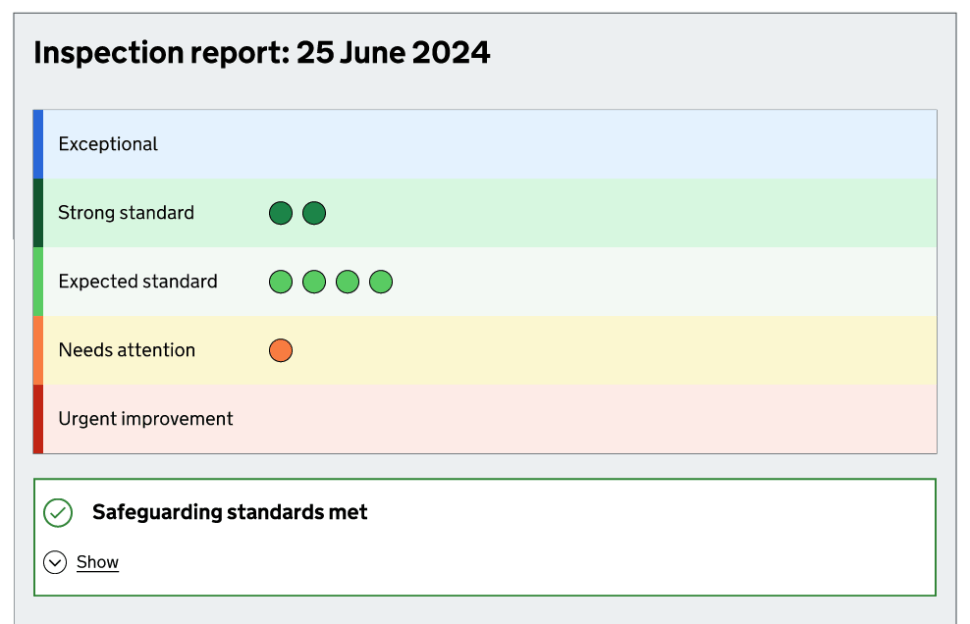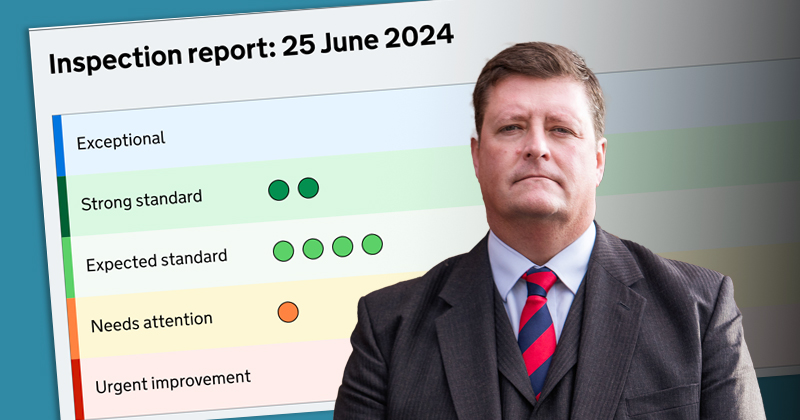Ofsted has renamed proposed grades and cut the number of inspection areas for new report cards, saying inspections will now provide “absolute clarity” for schools and parents.
But unions have said the final plans will “make things much worse”, with a group of leaders also demanding education secretary Bridget Phillipson intervene to delay the roll-out of “extremely worrying” new inspections.
The watchdog has also been accused of “ignoring” an independent wellbeing report it commissioned, which found report cards will increase stress on already-stretched leaders.
However Ofsted has announced when inspections return on November 10, they will only be for schools that have volunteered. Routine inspections will return no earlier than December 1 – and will be pushed back to the new year if there are enough schools volunteering for inspection.
Fewer judgments, grades renamed
Following its consultation, which received more than 6,500 responses, Ofsted has made eight key changes (you can read them all in our round-up here).
The inspectorate, in a summary of its consultation response, said organisations representing heads and teachers “had a strong negative reaction” to the proposals.
Leaders were also concerned more evaluation areas could lead to added workload and stress.
Ofsted has now announced the number of core evaluation areas inspected will reduce from nine to seven. The proposed “developing teaching” evaluation area will merge with “curriculum”, while “behaviour and attitudes” has been merged with “attendance”.

The evaluation areas are now: inclusion; curriculum and teaching; achievement; attendance and behaviour; personal development and well-being; and leadership and governance.
Safeguarding will be judged ‘met’ or ‘not met’, and there will be judgment areas for early years and post-16 provision too.
Despite criticism, Ofsted will stick with five grades – but they have been renamed.
- ‘Causing concern’ has been changed to ‘urgent improvement’
- ‘Attention needed’ to ‘needs attention’
- ‘Secure’ to ‘expected standard’
- ‘Strong’ to ‘strong standard’
- ‘Exemplary’ to ‘exceptional’
Routine Ofsted inspection roll-out delayed
Toolkits definitions have also been “tightened” and each grade will include a “narrative explaining inspectors’ justification,” says Ofsted.
Ofsted has also further delayed the return of routine inspections.
Inspections will return on November 10, but only for schools that have volunteered. Routine inspections will return no earlier than December 1 – and will be pushed back to the new year if there are enough schools volunteering for inspection.
Ofsted chief Sir Martyn Oliver said the reforms are “the biggest change in Ofsted’s way of working” in its 33-year history.
He said the new framework “will be fairer but rigorous” and help bring “absolute clarity to parents and to professionals”.
“I’m really pleased that this report card gives both, at a glance, a summary, and then …narrative and detail and next steps in areas of improvement,” he said.
Ofsted says the implementation and impact of the reforms will be tested “through a continual programme of evaluation which will include “an externally commissioned review of the operation of the renewed framework”.
‘Damning’ wellbeing report ‘ignored’
However, the changes have not allayed unions’ concerns.
Ofsted also today published the findings of an independent wellbeing impact assessment of its new report cards, led by Sinéad Mc Brearty, CEO of mental health and wellbeing charity Education Support.
Staff wellbeing is key to the Ofsted reforms – which were triggered by the death of headteacher Ruth Perry.

But the report found the new report cards will increase stress and workload for school staff, despite the sector already being among the top three “industries” with high levels of work-related ill health.
Paul Whiteman, general secretary of school leaders’ union NAHT, said the “frankly damning” report shows new inspections “do not reduce pressure on leaders” – repeating calls for the return of inspections to be delayed.
Ofsted’s plan to push ahead regardless “speaks of an inspectorate that has completely lost the trust of the profession, that has failed to properly listen to teachers and leaders”, he added.

The watchdog said it has taken wellbeing concerns “extremely seriously” and nothing in its plans “should add to a provider’s workload”.
The inspectorate also said it is adding an extra inspector to visits – to free up more time for the lead inspector to “focus on engaging with leaders, coordinating their inspection team, and overseeing and quality assuring the inspection”.
“This means we can reduce pressure on leaders through the inspection process.” The extra inspector “should ease any anxiety for leaders by acting as a regular point of contact.”
‘Real risk of causing more preventable deaths’
Ofsted maintains the reforms have been broadly welcomed by parents.
Jason Elsom, Chief Executive of parent charity Parentkind, said: “Ofsted has shown that it is listening to parents.”
Sir Jon Coles, chief executive of United Learning, England’s largest academy trust, added: “It is important to our school system, to parental confidence and ultimately to the success of children that there is high quality, trusted, independent and rigorous reporting to parents about the quality of their local schools. I am pleased that the new inspection framework looks set to provide this.”
Oliver said that “children deserve the best possible education; their parents deserve the best possible information and education professionals deserve to have their work fairly assessed by experts. The changes we are presenting today aim to achieve all three of these things.”

But Pepe Di’Iasio, general secretary of leaders’ union ASCL, said it “will not be possible” for inspectors to reliably apply a five-point grading scale” in a single two-day inspection, even with fewer evaluation areas.
This means decisions will not be made “consistently between different settings”
ASCL is considering whether to recommend Ofsted inspectors that are members “withdraw their services”.
NEU general secretary Daniel Kebede agreed replacing headline grades with grades across multiple areas will make things “much worse”, bringing “more pressure” for teachers, “more ranking and competition”.
Unions, alongside Perry’s sister Julia Waters, headteachers and former inspectors, have asked Phillipson to intervene and delay the return of inspections.

“Without meaningful reform, this new system will continue to drive excessive pressure, ill-health and stress for the profession, with the very real risk of causing further, preventable deaths,” the letter adds.
School profile rollout confirmed
Government has also confirmed that the “worst-performing schools” – those in ‘special measures’ will be converted to academies.
Meanwhile those requiring ‘significant improvement’ will get support from regional improvement teams. Government is expected to publish a response to its accountability consultation today.
The government has also confirmed today that testing of so-called “school profiles” will begin this academic year. Full roll-out will be in 2026-27.
DfE previously described them as a “digital service” that will act as a “one-stop shop” for parents and professionals to view a “broad range of information” about a school.
They will allow users to benchmark schools’ performance against each other by measures like size, deprivation, attendance and attainment.















Your thoughts